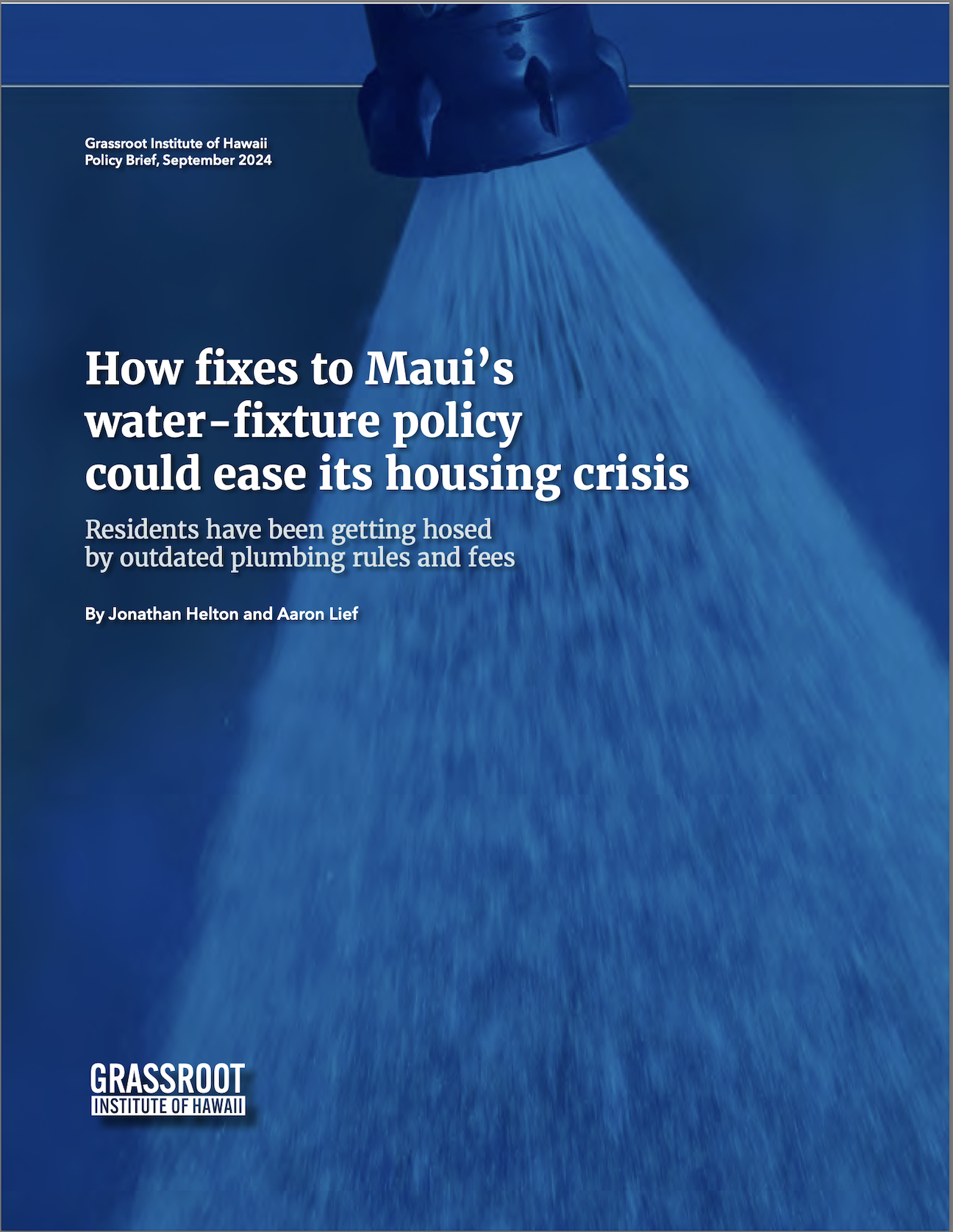Report cites regulations as a hurdle for Maui housing growth
by Merrilee Gasser The Center Square
(The Center Square) — A new report suggests that outdated policies for water fixtures are hindering housing growth in Maui.
Costly plumbing regulations have emerged as an "obscure" obstacle to housing growth in Maui County, said Grassroot President and CEO Keli'I Akina.
Researchers with the Grassroot Institute of Hawaii, a nonprofit policy research organization, found that Maui County's water-fixture-unit requirements and fees related to household appliances like kitchen sinks, toilets, showers and washing machines are the highest in the state.
Due to the "outdated" requirements, water fixture unit assignments are often not aligned with water meters' physical capacities, the report said.
"The situation has become so severe that some homeowners resort to removing laundry room sinks or exterior hose faucets in order to allocate water fixtures elsewhere in their homes," said Akina. "Maui County's outdated water-fixture regulations are especially worrisome in light of how they might be hindering the rebuilding and recovery of Lahaina and other areas affected by the devastating August 2023 wildfires."
The Lahaina fires destroyed approximately 3,000 homes, according to the report.
However, Maui County's housing crisis started before the Lahaina fires, said Akina, and is also exacerbated by zoning, permitting, taxes and fees. Still, removing limits for water fixtures could be a key to eliminating barriers, the report said.
Currently, Maui County levies a fee of $389 for each additional water fixture unit for 5/8 inch meters. If a homebuilder bought the maximum allowable extra units, which is 11, it would cost around $4,200 on top of an additional $12,060 for the initial water meter, the report found.
"Ironically, county incentives such as the ʻOhana Assistance Program have been enacted to encourage homeowners to build housing in existing urban areas with access to adequate infrastructure, but fees for water-fixture units run counter to that goal," the researchers wrote.
In addition to removing or adjusting Maui's water fixture limits, the report recommends reducing the fees for additional water fixture units and allowing homeowners to own and manage their water meters.
"If the Department of Water Supply no longer had to foot the maintenance bill for water meters, it would no longer need to be concerned with how many water appliances a homeowner might have," the report said. "If homeowners had more water fixtures than could be supplied from their water meters, they would be incentivized to reduce their water-fixture usage so as not to damage their water meters or render their appliances inoperable, or else buy a new water meter."
* * * * *
Maui County plumbing rules hindering housing, new Grassroot report shows
Grassroot Institute of Hawaii researchers find that the county's policies regarding water fixtures are outdated and need reform
News release from Grassroot Institute, Sept 4, 2024
HONOLULU, Sept. 4, 2024 >> A new report from the Grassroot Institute of Hawaii shows how small changes to plumbing regulations could have a big impact on Maui County’s housing crisis, especially as thousands of Maui residents remain displaced by the devastating August 2023 wildfires.
Titled "How fixes to Maui’s water-fixture policy could ease its housing crisis," the brief was written by Grassroot researchers Jonathan Helton and Aaron Lief.
Keli‘i Akina, Grassroot president and CEO, wrote in the report that Grassroot previously identified zoning, permitting, taxation and fees among the barriers to homebuilding, “but one of the most interesting — and somewhat obscure — issues our researchers have encountered is how water-fixture regulations are stifling housing growth in Maui County.”
As the report explains, water fixtures are household features and appliances that use water, such as kitchen sinks, toilets, showers and washing machines. The county assigns each fixture a score based on how much water it is estimated to use, measured in water-fixture units, and sets the maximum number allowed per water meter, which the county charges to install.

“If calculated properly, the water-fixture units assigned should align closely with the physical capacities of the water meters,” the report explains. “However, this doesn’t seem to be the case with Maui County,” where the scores have not been updated since 1995.
For instance, the Uniform Plumbing Code of the International Association of Plumbing and Mechanical Officials rates an outdoor water faucet, officially known as a “hose bib,” at 2.5 fixture units, with each additional bib at 1 fixture unit. Maui County, on the other hand, rates all hose bibs at 3 fixture units. Additionally, the Uniform Plumbing Code assigns dishwashers a lower score than toilets, whereas Maui County does the opposite.
“Policymakers should prioritize updating or eliminating the county’s water-fixture-unit requirements and related fees, which are the highest in the state,” the report says. “County policymakers also should consider transferring ownership and management of water meters to homeowners, which would encourage homeowners to use their water appliances more efficiently.”
According to the report, some residents in Upcountry have been waiting to buy water meters for more than 20 years.
“Maui had a housing problem prior to the August 2023 wildfires, which destroyed about 3,000 homes,” the report concludes. “Now that it needs even more new housing, the county’s existing fixture-unit rules stand as a greater roadblock.”
# # #
The Grassroot Institute of Hawaii is a nonpartisan, nonprofit research and educational institute devoted to promoting individual liberty, economic freedom and limited, accountable government. Its goal is to improve the quality of life in Hawaii by lowering the cost of living and expanding opportunities for all.